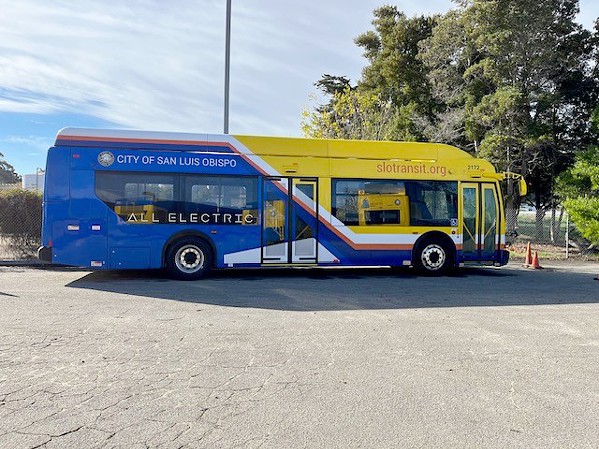[{
"name": "Ad - Medium Rectangle CC01 - 300x250",
"id": "AdMediumRectangleCC01300x250",
"class": "inlineCenter",
"insertPoint": "8",
"component": "2963441",
"requiredCountToDisplay": "12"
},{
"name": "Ad - Medium Rectangle LC01 - 300x250",
"id": "AdMediumRectangleCC01300x250",
"class": "inlineCenter",
"insertPoint": "18",
"component": "2963441",
"requiredCountToDisplay": "22"
},{
"name": "Ad - Medium Rectangle LC09 - 300x250",
"id": "AdMediumRectangleLC09300x250",
"class": "inlineCenter",
"insertPoint": "28",
"component": "3252660",
"requiredCountToDisplay": "32"
}]
The city of San Luis Obispo's Transit Division is bidding farewell to diesel to make space for more zero-emission buses by the end of 2026.
"SLO Transit currently has two battery electric buses and another six electric buses on order," said Alex Fuchs, the mobility services business manager of Public Works, in an email to New Times. "The six additional buses should arrive in either summer or fall 2025."
The SLO City Council, with Mayor Erica Stewart absent, approved an order to purchase two more battery electric buses for SLO Transit at its March 19 meeting. The total of 10 such buses will result in SLO's fleet being 60 percent zero-emission by the end of 2026—putting the city further in compliance with the California Air Resource Board's forward-looking regulation.
According to the board's Innovative Clean Transit regulation that went into effect in 2019, all public transit agencies must gradually transform their usually diesel or gasoline-powered bus fleets to zero-emission vehicles. By 2026, 25 percent of new purchases made by small transit agencies like SLO Transit must be zero-emission buses. In 2029, both small and large transit agencies will increase the purchasing percentage to 100 percent so that they can meet the goal of possessing fully zero-emission fleets by 2040.
While the City Council only adopted the state-required zero-emission rollout plan on March 5, it authorized the purchase of the six battery electric buses last July. That aligned with the city's climate action goals and its 2023-25 financial plan, which accounts for a fleet update project.
With the council's latest bus purchase approval, SLO Transit will once again turn to Washington state for help. The northern state offers a "cooperative procurement agreement" for transit vehicles that eliminates the usual process of making bids. It cuts down on staff time and resources needed to solicit and carry out separate procurement agreements. SLO used the Washington state agreement in 2023 to issue a purchase order for the six buses from transit bus manufacturer Gillig.
Fuchs said that cooperative procurement agreements help local agencies to purchase directly from the supplier through an existing contract.
"In our case, the state of Washington has an agreement with multiple vehicle providers that has met all the federal requirements," Fuchs said.
SLO Transit determines bus replacement based on the "useful life benchmark" established by the Federal Transit Administration. The metric sets the lifespan of a heavy-duty bus at 12 years or 500,000 miles, after which it must be retired.
The two battery electric buses recently approved for purchase will replace two 40-foot low floor diesel buses that are 11 and 12 years old.
A host of other diesel and gasoline-fueled buses are facing retirement. The six battery electric buses on order will take the places of six 16-year-old diesel buses. Two diesel buses bought in 2007 will soon be retired. Eight other buses are scheduled for replacement over the next 10 years.
"More than half of SLO Transit's fleet has met or exceeded this useful life benchmark," Fuchs said. "Funding replacement of our aging fleet ensures reliable and environmentally friendly services can continue to be provided."
The city's financial plan earmarked more than $10 million over a five-year period to replace the fleet with battery electric buses. Fuchs said that this amount includes $2.7 million in federal grant funding from the Federal Transit Administration and $478,124 in state grants from the Transportation Development Act.
The federal and state grants helped purchase the two battery electric buses at $2.5 million. The remainding funds will be used to buy and install charging stations and a power block.
SLO Transit anticipates the buses will be delivered in summer 2026 and will be functioning by the end of that year. But time is a growing problem, according to Fuchs.
"There are fewer U.S.-based manufacturers than ever, so production timelines continue to get longer," he said. "It used to be 12 to 18 months, now its 24 months, and I can see a scenario where production timelines reach 30-plus months." Δ
Latest in News
Readers also liked…
-

Coast Unified teachers upset over new position's salary and qualifications
Oct 20, 2022 -

SLO police identify alleged driver who hit and killed couple
Dec 22, 2022 -

When the levee breaks: Oceano residents, county officials walk a tightrope of regulations to manage Arroyo Grande Creek, which some say led to the levee's failure in January
May 18, 2023










